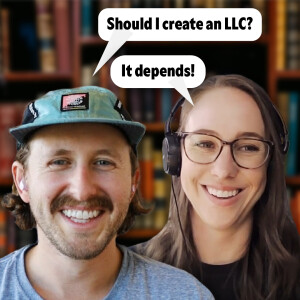The Remote Investor

Welcome to The Remote Investor, an ongoing conversation on the topic of building wealth through real estate. Hosts Michael Albaum and Pierre Carrillo discuss the messy world of owning rental properties in remote locations. Whether you’re a seasoned investor or just trying to break through the barriers to entry, this podcast is your go-to resource for invaluable knowledge gained through hands on experience. The Remote Investor is brought to you by Boldstreet.ai
Welcome to The Remote Investor, an ongoing conversation on the topic of building wealth through real estate. Hosts Michael Albaum and Pierre Carrillo discuss the messy world of owning rental properties in remote locations. Whether you’re a seasoned investor or just trying to break through the barriers to entry, this podcast is your go-to resource for invaluable knowledge gained through hands on experience. The Remote Investor is brought to you by Boldstreet.ai
Episodes
Episodes



Tuesday Dec 24, 2024
Smart Strategies to Save on Homeowners Insurance
Tuesday Dec 24, 2024
Tuesday Dec 24, 2024
The homeowners insurance landscape is shifting, with rising costs and new challenges for property owners nationwide. In this episode, Michael Albaum and Pierre Carrillo break down the current state of the insurance market, sharing expert strategies to help you navigate this evolving environment.
From understanding policy changes to reducing premiums, Michael explains actionable steps like shopping for insurance annually, adjusting deductibles, and optimizing coverage. They also discuss the critical role of public adjusters in managing claims and how to minimize the long-term impact of claims on your finances.
Whether you're a homeowner or a real estate investor, this episode offers valuable insights to help you make informed decisions, safeguard your assets, and save money on insurance.
Episode brought to you by: https://myfiacademy.com/



Tuesday Dec 10, 2024
Why you'll never retire on single-family rentals! Interview with Michael Blank
Tuesday Dec 10, 2024
Tuesday Dec 10, 2024
In this episode, seasoned real estate investor Michael Blank shares his journey from a career in computer science to building a thriving portfolio in multifamily real estate. Michael delves into the strategic advantages of multifamily investments, offering insights on scaling for greater returns and creating passive income streams. He unpacks the challenges of navigating fixed-rate debt, the flexibility of bridge loans, and the importance of meticulous due diligence. Michael also addresses the impact of rising insurance and interest rates, and the value of professional property management. Tune in to gain actionable strategies and discover the tools and educational resources that can help you succeed in multifamily investing.
Episode brought to you by: https://myfiacademy.com/
Michael Blank's Links:
https://apartments101.co/
https://www.youtube.com/@Themichaelblank



Tuesday Nov 26, 2024
Do you need an LLC to start investing in real estate? with Kellie Chrisman
Tuesday Nov 26, 2024
Tuesday Nov 26, 2024
Protect your assets as a real estate investor with insights from attorney Kellie Chrisman! In this episode, Kellie dives into the importance of LLCs for liability protection, the risks of operating without an entity, and the cost considerations like California’s $800 annual fee. She explains the differences between S corps and C corps, provides tips for building a strong legal foundation, and emphasizes the value of having a professional team, including lawyers, accountants, and insurance agents. Whether you’re just starting or expanding your portfolio, this episode is packed with essential advice for real estate investors!
Kellie's website: https://www.taylorchrismanlaw.com/
This episode is brought to you by https://myfiacademy.com/



Tuesday Nov 12, 2024
House Hacking: How to live for free and build wealth
Tuesday Nov 12, 2024
Tuesday Nov 12, 2024
In this episode, we sit down with Craig Curelop, founder of the FI Team and author of The House Hacking Strategy, to uncover the ins and outs of house hacking. Craig shares his journey in real estate, explaining how house hacking—a strategy of buying a property larger than you need, with a low down payment, living in one unit or a room, and renting out the others—can help cover mortgage costs and build wealth. From living behind a curtain in a duplex to achieving financial freedom, Craig highlights the sacrifices and strategies needed to make house hacking work, even in expensive markets like Denver and California. Learn how to analyze cash flow, gauge appreciation potential, and make house hacking a profitable path to financial independence.
Episode brought to you by: https://www.myfiacademy.com/
Buy Craig's book here: www.biggerpockets.com/househacking
Invest2FI Podcast here: https://invest2fi.com/
The FI Team: https://www.thefiteam.com/



Tuesday Oct 29, 2024
How 18-25 year-olds can prepare to invest in real estate
Tuesday Oct 29, 2024
Tuesday Oct 29, 2024
Pierre Carrillo and Michael Albaum share insights on how young people can prepare for real estate investing despite financial challenges. Michael recounts how he maximized his savings by prioritizing jobs that offered valuable perks, such as car and phone coverage, and by sharing living expenses with roommates. He highlights the value of high-yield savings accounts and advises caution around stock market volatility. Michael also details his use of a 401(k) loan to fund a real estate down payment, which he repaid with interest, allowing him to grow his retirement fund in the process. Their advice centers on frugal living, careful budgeting, and leveraging tax-advantaged accounts. The key takeaway: making small sacrifices now can pave the way for significant, long-term success in real estate investment.



Tuesday Oct 15, 2024
How will lower rates affect home prices?
Tuesday Oct 15, 2024
Tuesday Oct 15, 2024
Join Michael Albaum and Pierre Carrillo as they explore how the recent half-percent federal funds rate cut is shaking up the real estate market. Michael shares his personal experience with a loan modification, saving $500 a month on his mortgage, while the two debate whether lower rates will drive home prices up. They break down the effects of supply and demand, geographic factors, investor behavior, and the potential impact on new construction. Tune in for our discussion on how this rate cut might influence our next real estate move.
Brought to you by: https://www.myfiacademy.com/



Tuesday Oct 01, 2024
How to Maximize Real Estate Returns: Cash or Leverage?
Tuesday Oct 01, 2024
Tuesday Oct 01, 2024
Michael Albaum and Pierre Carrillo explore the differences between paying all cash for a property and using a mortgage. Mike demonstrates how each variable in the consideration effects the return. Through an example of a property that is listed at $250,000, they discuss how a minimal rent increases, or a small difference in interest rates can drastically change the cash-on-cash performance of the asset. They also discuss why which types of offers are more attractive to sellers and ways that you could mix these approaches to purchasing property. This conversation provides valuable insights for real estate investors weighing the pros and cons of either approach.



Tuesday Sep 17, 2024
5 Things I wish I knew before investing
Tuesday Sep 17, 2024
Tuesday Sep 17, 2024
In this episode, Michael Albaum and Tom Schneider share key real estate investing insights. They emphasize acting quickly, learning from mistakes, and having financial reserves for unforeseen expenses. The duo highlights the long-term value of property appreciation, tax benefits like depreciation, and balancing cash flow with growth. They also discuss the importance of school ratings and safety in property selection. Real estate investing, they note, is more nuanced than social media suggests but remains achievable with the right approach and relationships, especially with property managers.
Brought to you by: https://www.myfiacademy.com/







